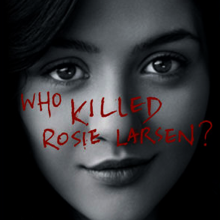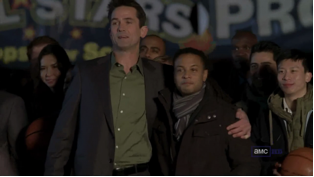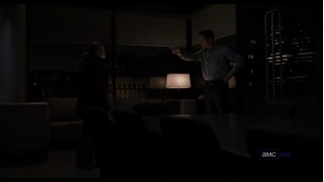Reconsidering The Killing as a Feminine Narrative Form
Kristen Warner / University of Alabama and Lisa Schmidt / Independent Scholar

A few weeks ago, AMC aired the season finale of its latest original series The Killing to something less than universal acclaim. An adaptation of a Danish series (Forbrydelsen), The Killing participates in genres deeply entrenched in television: the crime drama and the police procedural. However, the show diverges from convention in its investigation of a single murder case extending over a whole season—and beyond, apparently. For the finale did not reveal that one piece of information that invested viewers (presumably) expect and demand: Who killed Rosie Larsen?
In the days following the finale, various media critics expressed their “disappointment,” “disgust,” and even hatred—some with “the burning intensity of a thousand white-hot suns.” In his blog post, Jason Mittell is far more equable but nevertheless agrees that The Killing failed to deliver on its promise as a contemporary serialized narrative.
These sentiments hyperbolize a motif predominant in criticism of The Killing even before the finale. To paraphrase a number of sources: The Killing started off strong but lost its way; apparently uncertain of how to plot a proper police procedural, the producers resorted to a series of false starts and red herrings, relying upon improbable plot turns, before stumbling to a disastrous finish. There were even implications that AMC should remove—or encourage the resignation of—showrunner Veena Sud.
We (Kristen and Lisa) do not share that consensus; in fact, we find ourselves perplexed by the general critical opinion of The Killing. It is not that we don’t have any investment in learning “whodunit,” just that we were content to explore the emotional and psychological complexities of the people struggling in the wake of Rosie’s murder, including lead detective Sara Linden and her new partner. Far from being bored, we were engrossed, even deeply moved by the “red herring” dealing with the misidentification of a young Somali teacher Bennett Ahmed as a key suspect. This was a plot arc of several episodes, exploring the ugly but very ordinary racism of nearly every one of the protagonists.

In our own informal criticism of the show (conveyed primarily by chat), we shared our puzzlement at the expectation of certain critics and audiences who believed that The Killing should behave like a conventional police procedural or mystery story, with tightly crafted plot moments based around what is considered “action.” To the contrary, we found pleasure in the ways The Killing allowed its melodramatic emotion – not to mention the camerawork – to linger beyond the boundaries of its official generic conventions and connect itself to another genre that is closely associated with television: the daytime soap opera. We wonder how anyone could miss the soapiness of Sud’s series. Consider the following, frustrated beat-by-beat description of a scene from the finale that points obviously and yet obliviously to The Killing’s true generic identity:
In the dark, she [Linden] and the councilman [Richmond] — flashing his absolute best, rock-gargling Batman voice to date — deliver one of those “important” sorts of dramatic exchanges that no doubt sound better on someone’s Final Draft document at one in the morning than they do in the mouths of actors. Linden accuses Richmond of being Orpheus — but then admits not knowing who Orpheus is. (Good policing No. 1!) Richmond, rather than saying literally anything that could diffuse the tension in the room or remove the presumption of guilt, whispers a very Basil Exposition–y rundown of the famous Greek myth.1
Sure, this critic was absolutely spot-on in pointing out how illogical and perhaps occasionally absurd many of the narrative turns and dialogue were in the episode. But this immediately calls to mind the soap opera, a genre whose storylines and dialogue indeed tend to the illogical and the absurd.

Framing The Killing according to the notion of a feminine narrative form, we suggest, is a necessary intervention. Tania Modleski’s seminal piece on the soap opera foregrounds the vexing manner by which the central questions emerge within a soap — questions of paternity, questions of “whodunit” quite similar to The Killing’s “Who killed Rosie Larsen?” — and then demonstrates how the operative logic of the genre is ultimately one of deferred resolution and extended waiting for the viewer.2 What’s more, when the question is resolved it only generates more questions, making the viewer almost wish the damned question was not answered in the first place.
It is our contention that Sud’s series functions with a similar serialization strategy that withholds narrative closure: the focus on the pathos of the characters more than on the logic of policework; the emphasis on Seattle’s never-ending rainy season (tears anyone?) rather than on naturalistic settings; the insistence on sudden histrionic verbal exchanges between characters where no new information is provided rather than on perfunctory dialogue used to advance the narrative.

All of these choices are found in the daytime soap — which ultimately speaks to the strategy of viewing The Killing through a feminine lens. Because of the ways that The Killing structured itself in a soapsy style, ending most episodes with cliffhangers and misdirection, we (Kristen and Lisa) felt quite comfortable just letting the show and its showrunner take us where they wanted because, again, for us the show was not just about solving the murder mystery but about watching Sud roam with her storyline. As she says, “it is about the journey; not the destination.”3
While we were considering The Killing’s generic identity, it occurred to us that the pleasures we have received from the show are also very similar to the pleasures of consuming fanfiction. Can it be a coincidence that fanfiction is largely a women’s genre or that, as with many women’s genres, fanfiction is melodramatic to excess? Fanfiction concerns itself with the places in between “plot,” with issues having to do with relationships and emotions. Anyone who has ever read fanfiction knows that these are stories tending to turn not on physical, external action but on internal, emotional events. In other words, fanfiction closely resembles the “(in)action” of The Killing. This is a show that dwells on the personal, social and communal aftermath of a murder, not necessarily in realist terms but in ways that are meant to explore emotional truths.
Our final point concerns the position of a female showrunner producing a series in an ostensible genre that is predominantly male-driven in terms of both narrative and production. As mentioned earlier, there was a reviewer whose barely masked contempt for Sud as showrunner and head writer exploded to such a point that he seemed surprised that AMC was keeping the creative team (Sud included) intact.

Sud’s claim that she is producing “a different kind of show” is definitely a point of contention and frustration for critics and audiences alike. However, what is of highest importance is that however she self-fashions her identity as showrunner, be it willful and stubborn disregard for industrial realism or a performance of bravado she does not inherently possess, Sud deserves to be engaged on her own terms and not with a diminishment of her power or authority or competence as showrunner based on viewer expectations. Put simply, “hating on” Sud because she chooses to employ several narrative strategies—namely those that can be read through a feminine paradigm of emotion rather than the more masculine storytelling strategies we have all become more accustomed to—smacks of sexism and something less than thoughtful criticism. This remains true regardless of the gender of the person performing the criticism.
Image Credits:
1. Who Killed Rosie Larsen?
2. Relationship between Muslim schoolteacher and mayoral candidate.
3. The Killing, Author screen capture.
4. It rains a lot on The Killing …
5. a lot.
6. Veena Sud
Please feel free to comment.
- Andy Greenwald, “The Killing Season Finale Recap: Unsolved Mysteries.” New York Magazine. 20 June 2011, 30 June 2011. http://nymag.com/daily/entertainment/2011/06/the_killing_unsolved_mysteries.html. [↩]
- Tania Modlesi. “The Search for Tomorrow in Today’s Soaps: Notes on a Feminist Narrative Form.” Film Quarterly. Vol. 33:1. 1979. [↩]
- Alan Sepinwall, “Interview: The Killing Showrunner Veena Sud on the Season Finale.” Hitfix. 19 June 2011, 30 June 2011. http://www.hitfix.com/blogs/whats-alan-watching/posts/interview-the-killing-showrunner-veena-sud-on-the-season-finale [↩]
I enjoyed this piece, but you don’t make clear whether you had/have seen the Danish original.
It would be interesting to see if you could map your theory of a ‘feminine’ narrative onto the real show.
Best wishes,
Nigel Floyd
PS. I can’t believe the US series didn’t reveal the murderer in the final episode. Looking at this in the most cynical light, was this purely because they were hoping to be commissioned to make a a second series.
PPS. I watched the first two episodes of the US re-make on UK television last night. I hated them: badly cast, too clipped, not emotional undertow.
Pingback: Reconsidering #TheKilling as a Feminine Narrative Form by @kristenwarner & Lisa Schmidt http://flowtv.org/2011/07/reconsidering-the-killing | Tweets
Hi Nigel,
Thanks for your comment! Neither of us have watched the Danish version yet. I am very curious about it and if this idea can be applied to it but the US adaptation is the real version for me right now.
As far as not revealing the killer, Sud and others mentioned that the Danish version had 20 episodes while the US version had only 13. So for me it’s not extremely shocking that we have no killer yet.
To your last comment, I remember not being sure about liking the series in the first two episodes–well until the last 5 minutes of episode 2. That’s when I was hooked.
I am so relieved to know that I am not the only one who still enjoyed The Killing through the end. I was actually surprised at how people were acting so entitled in response to the finale, like they were owed an answer at the end, and how they equated the lack of an answer with an objective failure.
I like your comparison to the soap opera genre. I don’t typically watch daytime soaps, so the idea hadn’t crossed my mind, but it makes total sense. And that connection to a feminine genre definitely helps explain why there was such a harsh backlash from television critics (still a male-dominated field).
Overall, a great piece. I hope it makes some critical viewers a little bit more aware of their problematic, knee-jerk reactions.
Great column! I wanted to follow up on Carolina’s comments to point out that this kind disappointment at a “failed” ending has a long history in US TV, with the most notable instance being Twin Peaks. But critics, scholars, and general viewers have also made such complaints about other series, including The X-Files and The Sopranos. I read this much as do Kristen and Lisa, in that there is a masculinist expectation for a satisfying conclusion, because that would help to cement the status of a program as “not a soap opera” and thus more culturally legitimate. I have yet to watch The Killing, but this column has made me eager to check it out!
Tacking onto Elana – every single lesbian fanatic of Xena was totally disappointed in its conclusion (for the purposes of all who don’t know *SPOILER* she gets beheaded).
Good piece! I like that Kristen & Lisa question what it means for something to “fail.” It’s industry rhetoric used to describe a personal reaction, as if one is conclusive proof of the other. I like that you (K & L) poke at the ideological baggage attending this particular “failure” as well. It seems that engaging in this kind of dialogue is bound to larger dynamics of power — a point way too frequently eluded by this kind of criticism.
“elided” — doh! iPhone typing.
Hi Elana and Hollis! Thank you both for your thoughtful comments.
@Elana. You are so correct to point to the history of so-called “failed” endings. We really wanted to beg the question as to what makes a narrative “good” or “bad”…even while admitting that we struggle ourselves with the tendency to judge shows based upon how they fulfill (or do not) certain conventional ideas about resolution and structure. It is interesting how so many of us want to pretend that it is NOT the melodramatic aspects of the story that draw us in and keep us watching, isn’t it?
@Hollis. Absolutely true! Those ideologies of success and failure are so very engrained… I’m certainly not free of them, even as I complain of them being deployed by critics.
Lisa
I agree that an important aspect of what worked best in The Killing is its melodrama, particularly concerning the Larsen family and the one episode where Linden & Holder focus on finding her son. But much of what worked least with the show was its lack of melodrama – we almost never saw the emotional reactions to events impacting relationships between characters aside from the Larsens, which is a hallmark facet of soap storytelling. The plot instead foregrounded procedural moves (often poorly) and kept us at arms length from most of the characters. As I noted in my piece, it did very little to prompt curiosity beyond the murderer’s identity, and I’d say a good soap is expert at creating character curiosity in long-time viewers.
Additionally, the paratexts completely deny any link to soaps. There is other “highbrow television” that acknowledges some soapiness overtly – Twin Peaks, Six Feet Under, Friday Night Lights all come to mind. But The Killing‘s promotion deny those facets, instead focusing on mystery and its cinematic style (which is explicitly anti-soap aesthetically). And Sud’s interviews all link her show to landmark prestigious programs like The Sopranos, Lost, & Breaking Bad, and doesn’t try to contextualize the show’s openness to the “lower” form of soap opera as much as the “higher” mode of contemporary premium television. Paratexts are a huge factor in placing a show within genres, and I see no connections there to soaps (am I missing some?).
So I guess I’m not sold that this “generic misreading” is an explanation for why so many fans & critics decried the series finale (and much of what led up to it), but rather an alternate reading strategy that (to me at least) seems to push against the show’s paratexts, narrative and style. There was certainly knee-jerk sexism on many comment threads against Sud or Linden, but I don’t think that was a factor in the more thoughtful critiques. And I definitely don’t see this reading strategy as taking Sud on her own terms, which are pretty clearly anti-soap opera.
Pingback: Weekly Twitter Updates | Kelli Marshall
I tried to get through the third (post-double-pilot)episode of US re-make The Killing last night last night on UK television, but the unflattering comparison with the real Danish version made it impossible.
The casting is completely off (especially the lead role), the pacing is erratic and uncertain, the multiple ad breaks undermine one’s involvement, and almost everything that was good about the original has been jettisoned.
I couldn’t even make it to the end of the episode, and will probably not return to see series through to its (inconclusive) conclusion.
My feeling is as follows. if you preferred Let Me In to Let the Right One In, watch the US re-make of The Killing. And vice versa.
Do yourselves a favour, watch Forbrydelsen on DVD at the earliest opportunity.
Jason, thanks so much for reading and commenting. I must disagree with you on some points, however.
You are not the only reviewer to remark that the writing failed to explore the characters and their emotions. I have to admit that I am rather befuddled by this but I don’t think it’s the most critical point to debate. Of course people will always disagree in their readings and aesthetic assessments of shows.
With respect, I don’t think your comments speak to the point Kristen and I are trying to make, which has to do not with industrial labels but rather pointing to an alternative strategy for reading the text itself. I do agree that industrial and producer labels have much to do with genre, but this is not the entire story. It is quite understandable, and expected, that Veena Sud and AMC deny that The Killing has any affinity with soap opera; there are few labels that have a lower cultural standing.
This doesn’t alter the fact that the show functions as melodrama. The fact that melodramatic forms are considered of low aesthetic value is the very reason that viewers, critics and even producers feel it necessary (consciously or not) to deny the melodrama of highly serialized shows. In this opinion I have been influenced by Michael Kackman’s article on quality television and melodrama, here: .
Moreover, the presence of plot does not mitigate against the existence of melodrama — far from it! Plot is essential to melodrama. (A point which I would have loved to make in our original article if there were more words available to us). The more complex, diabolical, even fantastical the plot, the more impossible the emotional and moral quandaries faced by the characters. Consider the plot manipulations of Breaking Bad (I am just finishing Season Three). Without the highly improbable scenario of the high-school-teacher-meth-maker-with-DEA-agent-brother-in-law-whose- wife-figures-out-what-he’s-up-to, we could never have the impossible emotional dilemmas that the characters now face. It is the latter, quintessentially melodramatic situation that makes the show so compelling. Similarly, it is the nature of murder as an emotional event, including all of the investigative machinations that follow, that render The Killing into a fascinating exploration of what Peter Brooks referred to as “the moral occult”.
Perhaps the show sometimes fails to live up to its own potential in this regard, I wouldn’t disagree with anyone there. On the other hand, the nature of seriality is that it sometimes takes a few seasons for the full, melodramatic richness of a show to manifest. If nothing else, I think that The Killing is a fascinating genre experiment and I can’t wait to see where it takes me.
Pingback: Serialization and Genre Expectations: The Case of The KillingJanet Staiger / University of Texas at Austin | Flow
Gotta love academics.
Comparing “The Killing” with its Danish source material seems to me an obvious necessity. Women, by the way, played a prominent role in bringing “Forbrydelsen” to DR. And Lund, while she has much of the Sherlock, Morse, Tennison, and “Fitz” in her, is, I think, “unique” in some ways.
And yup, the US version borrowed, somewhat reworked, and blued, of Forbrydelsen isn’t as good or as interesting, in my opinion.